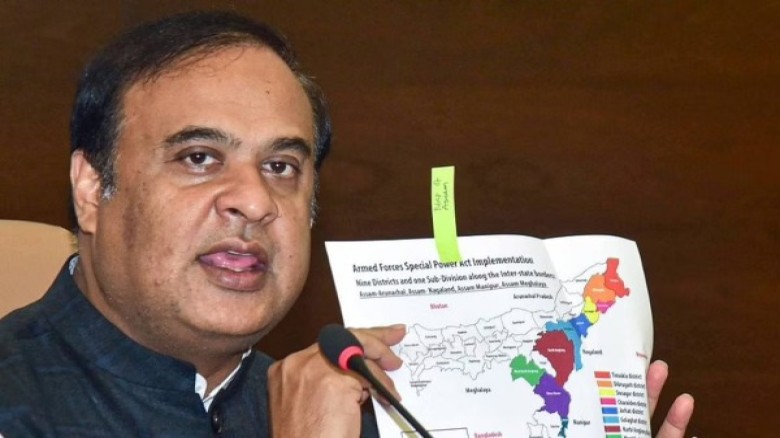Regional

The Armed Forces Special Powers Act (AFSPA) grants the armed forces broad powers in areas designated as "disturbed areas." This includes unwarranted arrests
Digital Desk: In a historic move last week, the Narendra Modi government at the Centre announced that it was withdrawing the Armed Forces Special Powers Act from several areas of Assam, Nagaland, and Manipur as a result of the “improved security situation”.
According to a Ministry of Home Affairs release, there has been a 74% decrease in militant occurrences in the Northeast since 2014.
The Armed Forces Special Powers Act (AFSPA) grants the armed forces broad powers in areas designated as "disturbed areas." This includes unwarranted arrests and, in some cases, executions.
Since a "botched" security operation in Nagaland's Mon, there has been an increase in calls for the abolition of AFSPA. Six people were murdered in the Army attack, while seven civilians and one jawan were slain in the subsequent demonstrations.
Also Read: "ULFA(I) lures youth through social media": Himanta Biswa Sarma
Assam
The MHA designated the whole state a disturbed area in 1990, during the height of the ULFA-led violence in Assam.
The state's whole region had been deemed 'disturbed' on February 28, 2022, the last time the Act was extended in the state.
Last Monday, the central government agreed to withdraw AFSPA from 23 Assam districts: Dhemaji, Lakhimpur, Majuli, Biswanath, Sonitpur, Nagaon, Hojai, Morigaon, Kamrup Metro, Darrang, Kamrup, Nalbari, Barpeta, Goalpara, Bongaigaon, Dhubri, South-Salmara Mancacha, Kokrajhar, Chirang, Baksa, Udal As a consequence, AFSPA has been withdrawn from 46,713.06 square kilometres, or roughly 60% of Assam's total geographical area.

The Act still remains in force in Tinsukia, Dibrugarh, Charaideo, Sivasagar, Jorhat, Golaghat, Karbi Anglong, West Karbi Anglong, Dima Hasao, and Lakhipur sub-division of the Cachar district.
According to a letter published by the Assam government last week following the declaration by the Centre, the Army is now stationed in just five districts of the state: Tinsukia, Dibrugarh, Charaideo, Karbi-Anglong, and Dima-Hasao.
Manipur
In Manipur, AFSPA was first implemented in the Naga-dominated territories of Ukhrul, Senapati, and Tamenglong in 1958, and was then expanded to Churachandpur and the Kuki-Zomi in the 1960s. It was eventually expanded to the valley, where a Meiti-based armed insurrection had established itself.
The central government decided in December to expand AFSPA to the whole state, with the exception of Imphal Municipal limits.
The national government stripped the "disturbed area" classification under the Act from 15 police stations in Imphal's six districts last week.
Imphal, Lamphel, City, Singjamei, Sekmai, Lamsang, and Patsoi police stations in Imphal West District; Porompat, Heingang, Lamlai, and Irilbung police stations in Imphal East District; and Bishnupur, Kakching, Thoubal, and Jiribam police stations in the districts with the same names.

Notably, all of the police stations from which AFSPA was removed are in the valley, where the overwhelming ethnic Meitei community lives.
To put this in context, the mountainous sections of the Northeastern state, which account for 90% of the total land area, are predominantly populated by tribals, whereas the ethnic Meitei group dominates the valley areas, which account for 10% of the entire land area.
The valley accounts for 40 of the 60 assembly seats in Manipur, which just elected a Bharatiya Janata Party administration led by Chief Minister N. Biren Singh, while the hills account for the remaining 20. As a result, the Meiteis have political clout. The Meitei-dominated valley appears to have contributed considerably to the BJP's success in the last election, with 26 of the BJP's 32 assembly seats coming from there.
Nagaland
The AFSPA was approved in Parliament at a time when Nagaland was embroiled in an armed conflict that began with the formation of the Naga National Council. The state finally enacted AFSPA.

AFSPA was expanded to encompass the whole state of Nagaland in December 2021. The Act has now been repealed in the state's Tuensang, Shamatore, and Tseminyu districts, as well as eight police stations in four additional districts. Chiephobozou is in the Kohima district; Wokha and Sanis are in the Wokha district; Tamlu and Longleng are in the Longleng district; and Kubolong, Mokokchung-I, and Changtongya are in the Mokokchung district.
Why AFSPA has been withdrawn?
According to the ministry statement, there has been a 60% decrease in security officer deaths and an 84% decrease in civilian deaths, indicating a "better security situation" in the states.
According to the MHA news release, the decision was based on the suggestion of "a committee formed in this context for the progressive withdrawal of AFSPA."
Leave A Comment